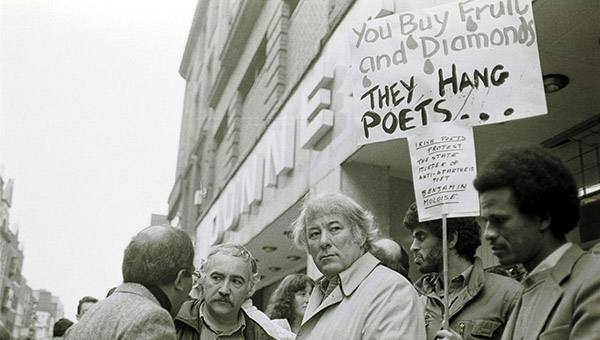
Seamus Heaney, internationally celebrated poet of Ireland and winner of the Nobel Prize in 1995, died in Dublin on Friday 30 August, aged 74. He and his wife Marie paid a memorable visit to South Africa in 2002 and what follows is a short account of the occasion.
I first met Seamus Heaney in a pub in Cambridge in 1984. Along with a couple of other poets, Seamus was going to read some of his poems. I had arrived early and by the time proceedings got underway I had already been mistaken (oddly enough, by a British poet himself well known, Norman Nicholson) for Seamus Heaney. This seemed to augur well for the future.
By 1984 Heaney was heading for pre-eminence among poets in the English-speaking world. Poems such as “Digging”, “Blackberry-Picking”, “Personal Helicon”, “The Forge”, and “Requiem for the Croppies”, with their gritty precision, unnerving vision and sense of wonder at the way ordinary actions and events could somehow conjure up the transcendent, had become established in the main stream of English literature.
Soon we introduced Heaney’s poetry into our first-year course at Rhodes, to the delight of a generation of students. All over South Africa (and now abroad) there are thousands of Rhodes ex-students who honed their critical skills on the verse of a poet who in 1995 would receive the Nobel Prize for Literature.
At the 1984 Cambridge Poetry Festival I was utterly charmed by Heaney’s poems and his reading of them – the Irish lilt in his voice, his infectious sense of humour, and his easy converse with his audience. At the end of the evening I ventured to ask him if he might consider an invitation to come to South Africa. This was 1984, remember. A quiet smile spread across his face and he said: “I don’t think that’s the kind of thing I should be doing at this moment.” Fair enough.
I continued to teach his poetry, convinced that his melding of the experiences of wonder and terror in his native Ireland, then in the midst of a sectarian war, and his attempts to create a meaningful poetry out of the strife and bloodshed of his homeland, had a powerful resonance and relevance here in South Africa. As he put it in his Nobel Lecture, the challenge was “to try to make space in my reckoning and imagining for the marvellous as well as the murderous”. It seemed to me crucial that our students (and indeed our poets) should confront that challenge, too.
In 2002, as I was about to retire, two of my colleagues, Wendy Jacobson and Ron Hall, invited Seamus and Marie Heaney to Grahamstown as honorary guests in the proceedings to mark the end of my tenure at Rhodes.
The Heaneys accepted, but must have been full of trepidation at what they might find. I shared this alarm on the day Rosemary and I collected them at Port Elizabeth airport, but within minutes it had become clear to me (and, as I would discover, to them) that we were souls of a kind. By the time our journey brought us to Grahamstown we had talked non-stop for an hour and a half and had shaped the beginnings of a lasting friendship.
There followed a week of rollicking fun and amazing events: memorable lectures by Seamus; a candle-lit poetry reading in a packed cathedral, preceded by an academic procession down High Street; the award of an honorary degree by Rhodes; several good dinners and late-night pub sessions at the Cock House; and a glorious weekend in Plettenberg Bay. The moving spirit and chief organiser of it all was Wendy Jacobson, who had also raised all the funds for the entire visit. Friends and ex-students still speak of the week’s events, epitomised by Seamus’s poems ringing through the cathedral, as a unique Grahamstown memory.
Now he is gone. Furthermore, he died in the very week of the eleventh anniversary of that astounding visit in August 2002. The loss to the world of English letters is immense, and all over the world memorial services will be held and memories and appraisals will be voiced in many important places. But here in Grahamstown we will be able to treasure a very special visit and our own vivid recollections of a great poet who once, here, in his own words, “set the darkness echoing” for all of us.
 SLiPStellenbosch Literary Project
SLiPStellenbosch Literary Project 